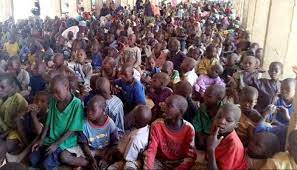Minister of Education, Prof Tahir Mamman, has said the federal government is mindful of the spiral effects which the dangers of out-of-school children phenomenon could pose to the country.
Acknowledging that Nigeria accounts for one out of every five out-of-school children in the world and 45% of out- of-school children in West Africa, the minister said the implication is that “Nigeria will constantly produce miscreants who are ready tools in the hands of criminal gangs.”
The term “out-of-school children” refers to children of primary or secondary school age who are not enrolled in a formal educational institution or who are deprived of the opportunity to access quality education and at the risk of missing out on valuable learning experience and skill development.
Speaking in Ilorin, the Kwara state capital at the official launch of the national campaign on out-of-school children and distribution of school materials to selected out-of-school children (OOSC) in Kwara state, the minister said research studies indicate that Nigeria accounts for one out of every five out-of-school children in the world and 45% of out- of-school children in West Africa.
Prof Tahir, who was represented by Dr. (Mrs) Olatunji David, said the ranking is disturbing and unacceptable for a country regarded as Africa’s largest economy.
He urged all key stakeholders, including civil society organizations, community and religious leaders, to act fast in checking the trend.
“Stemming the tide of out-of-school children is a task that this government seeks to accomplish. This is because we are mindful of the spiral effects of having a large number of uneducated population,” he said.
He also appealed to all good spirited individuals within the state to aid the less privileged in communities by adopting the children and youths who are of school age and supporting their education.
Kwara state governor, AbdulRahman AbdulRazaq, on his part said his administration’s investments in the education system of the state were fast yielding positive results, noting that this had continued to improve public school enrolment in the state.
The governor, who was represented by his Chief of Staff, Prince AbdulKadir Mahe, said the government birthed an e-learning system in basic schools to impart digital skills and improve learning outcomes, while boosting the capacity of teachers for maximum service delivery.



